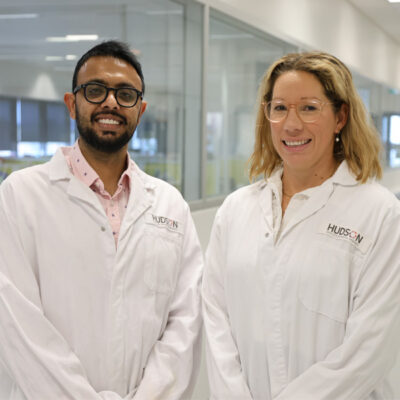Hudson Institute researchers awarded Heart Foundation fellowships
By Hudson Institute communications
Hudson Institute’s Dr Graeme Polglase and Dr Courtney McDonald have been awarded prestigious Heart Foundation fellowships to provide continuity to their research into life-threatening neonatal conditions.

The fellowships were announced on 24 November, as part of the Heart Foundation’s $14 million 2015 funding round.
Both researchers are based within the Institute’s fetal and neonatal hub, The Ritchie Centre, and are focused on improving interventions and treatments for pre-term infants vulnerable to brain injury at birth.
A recipient of the four-year Future Leader Fellowship, Dr Polglase also received the once-off $20,000 Paul Korner Innovation Award, awarded to the most innovative successful fellowship application.
The transition to independent breathing is a vital window of time for any newborn, but critical for pre-terms, for whom the risk of brain injury is increased due to their immature organs.
Dr Polglase’s studies will examine common obstetric and neonatal practices, including delayed umbilical cord clamping, and ventilation strategies, to scope the potential for improved strategies and treatments to prevent cardiovascular and brain injuries at birth.
“Through the development of new strategies to stabilise the breathing of preterm infants, I hope to reduce long-term cardiovascular and neurological morbidity,” he said.

A two-year post-doctoral fellowship recipient, Dr McDonald is investigating the use of stem cells derived from a baby’s umbilical cord in the repair of brain injury following neonatal stroke.
“Neonatal stroke is common, occurring in 1 in 5,000 births. The effects can be severe and long-lasting, including cerebral palsy, epilepsy, neurodevelopmental disabilities, impaired vision and behavioural disorders,” Dr McDonald said.
“Stem cells derived from the umbilical cord have the proven ability to repair damaged blood vessels and create new ones, and regenerate damaged tissue.
“My studies will investigate whether the regenerative effects of cord blood can be harnessed in the repair of the cerebral vasculature and brain injury following neonatal stroke.”
The fellowship recipients are both working towards better interventions for preterm babies during the vulnerable neonatal period.
“Being born preterm is the greatest cause of neonatal death and disability world-wide,” Dr Polglase said.
“My goal is to assist pre-term infants in getting the best shot at life by determining the best ways for treating and preventing cardiovascular disease immediately after birth,” he said.
Contact us
Hudson Institute communications
t: +61 3 8572 2697
e: communications@hudson.org.au
About Hudson Institute
Hudson Institute’ s research programs deliver in three areas of medical need – inflammation, cancer, women’s and newborn health. More
Hudson News
Get the inside view on discoveries and patient stories
“Thank you Hudson Institute researchers. Your work brings such hope to all women with ovarian cancer knowing that potentially women in the future won't have to go through what we have!”







